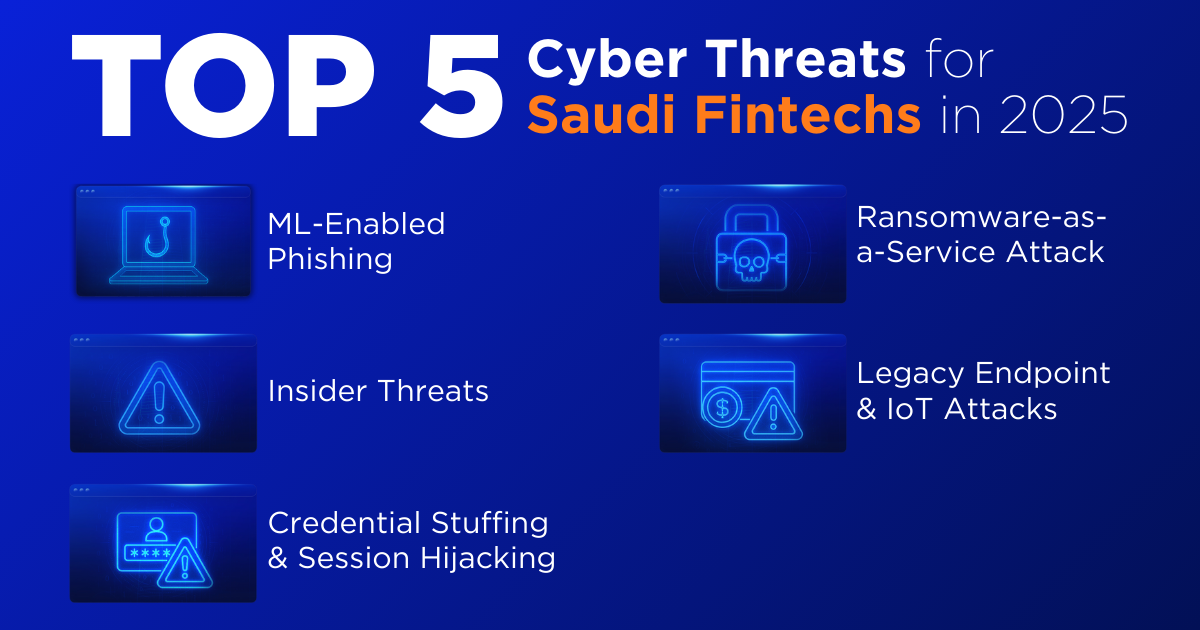Fintech and Cybersecurity in Saudi Arabia: What To Know
.png)
Over the past five years, Saudi Arabia’s fintech sector has experienced extraordinary growth. What began in 2018 with just 10 startups has expanded to more than 200 by 2023; a twenty-fold increase that reflects both the nation’s ambitious vision and the growing demand for innovative financial solutions.
To support this expansion, the Saudi government has introduced a range of laws and standards designed to protect customer data, maintain trust in the financial system, and give fintech companies the confidence to innovate.
But with rapid growth comes new challenges. The rules governing fintech and cybersecurity together have become more complex, and early-stage companies now face higher barriers to entry. For founders, it’s no longer enough to have a great product, you must also prove that you can protect sensitive information and operate securely in a competitive and highly regulated market.
This is why cybersecurity is more than just an IT concern; it’s a business strategy. Strong security practices help fintechs meet regulatory requirements, build trust with customers, and win the confidence of investors.
This guide will help fintech founders understand:
- Why cybersecurity in fintech is critical for survival and growth
- The cybersecurity challenges that fintechs face
- Top 5 fintech cybersecurity risks and threats
- 5 reasons why it's smart to outsource your SOC
- How to strengthen your cybersecurity posture
Why Fintech and Cybersecurity Together Are Critical for Growth
Fintech companies are prime targets for cybercriminals, and for small and medium-sized fintechs, the challenge is even greater; limited security resources combined with the responsibility of safeguarding vast amounts of sensitive customer data creates a perfect storm of vulnerability.
In Saudi Arabia, meeting the Kingdom’s strict regulatory and compliance requirements is not optional; it is the foundation for earning the trust of regulators, customers, and investors.
1. Building Trust with Customers, Regulators, and Investors
In fintech, trust is the currency that matters most. Customers need to feel confident that their financial data is safe every time they log in, transfer funds, or make a payment. A single incident can push them toward competitors who take security more seriously.
Demonstrating your commitment, through visible investments in cybersecurity and clear communication on your website, social channels, and investor reports, helps reassure all stakeholders.
2. Meeting Regulatory Requirements with Confidence
Saudi Arabia’s fintech sector is guided by robust standards from:
- Saudi Central Bank (SAMA): Focuses on protecting financial data through multi-factor authentication, and periodic assessments to ensure transaction integrity and data confidentiality.
- Capital Market Authority (CMA): Emphasizes preventing breaches and fraud through modern data protection, rapid incident reporting, and strategies aligned with CMA rules to safeguard investors.
- National Cybersecurity Authority (NCA): Covers risk assessment, data protection, and incident response, with regular audits, strong encryption, and continuous security monitoring.

Compliance isn’t just about avoiding penalties, it signals to regulators, customers, and partners that your business is prepared for sustainable growth. Leveraging initiatives like SAMA’s Regulatory Sandbox or CMA’s Fintech Lab can help you meet these requirements before launching at scale.
3. Enhancing the User Experience
Taking positive steps towards improving your fintech’s cybersecurity directly correlates with providing a great user experience.
Example: If a user faces a security problem or finds themselves going through tedious and outdated data safety measures, they are more likely to abandon your products and seek more user-friendly solutions that don't compromise security.
Striking the right balance, secure yet seamless, keeps clients loyal while safeguarding their data.
4. Protecting Data from Breaches
Data theft is the primary goal of most cyberattacks on fintechs. By prioritizing encryption, access controls, and proactive monitoring, you demonstrate to customers and investors that you are serious about preventing breaches and maintaining confidentiality.
5. Minimizing Fraud and Financial Crime
Robust security measures also reduce the risk of fraud, money laundering, and other financial crimes.
You can minimize the risk of fraud by adhering to the following laws and regulations:
- Anti-Money Laundering (AML) laws
- Countering Financing of Terrorism (CFT) laws
- Know Your Client (KYC) standards
6. Securing Business Continuity and Growth
For early-stage fintechs, one breach can jeopardize operations and destroy trust. Investing in cybersecurity protects your ability to innovate, launch new services, and expand without the looming risk of reputational or operational collapse.
The Reality: Cybersecurity Challenges for Early-Stage Fintechs
1. Finding the Right Talent
Early-stage fintechs often face difficulties finding, hiring, and retaining qualified security professionals.
.png)
2. High Costs of Security Solutions
Cybersecurity in fintech demands significant investment, from hiring experts, licensing, and infrastructure to continuous monitoring and compliance with frameworks like SAMA, NCA, and CMA.
3. Evolving Fintech Cybersecurity Threats
Typically, early-stage fintechs have limited budgets allocated to cybersecurity. At the same time, cyber threats are getting more sophisticated and severe than ever.

Top 5 Cyber Threats Facing Fintechs:
- Machine Learning-Enabled Phishing & AI-Powered Social Engineering
Malicious actors are utilizing advanced machine learning algorithms to send highly targeted and convincing phishing messages at scale.
These sophisticated scams increase the risk of credential theft and financial fraud, posing a significant risk to fintechs.
- Ransomware-as-a-Service (RaaS) & Malware Attack Surge
Ransomware attacks remain a dominant threat. Cybercriminals now “rent” ransomware kits, making high-impact attacks accessible to anyone.
Once deployed, they encrypt critical fintech systems, crippling operations until ransom is paid.
- Insider Threats (Malicious or Accidental)
An insider threat can be initiated by a company employee who has high-level access privileges to critical data. Insider threats are the hardest to anticipate as they come from within your business, and they can either be intentional or unintentional, like a user failing to spot a phishing email, for example.
- Legacy Endpoint and IoT (Internet of Things) Attacks
Legacy systems and IoT endpoints with poor security, like payment gateways, smart card readers, and mobile payment devices, open unmonitored paths into fintech networks, increasing the risk of exploitation and lateral attacks.
- Credential Stuffing & Session Hijacking
Cybercriminals use stolen passwords or hijack active user sessions to impersonate legitimate users, enabling them to make unauthorized transactions or steal sensitive data without being detected.
4. Regulatory Complexity
Early-stage fintechs must meet both international standards like GDPR and PCI-DSS and local requirements like SAMA and NCA guidelines. This complexity often slows market entry and growth.
5. Lack of Centralized Security Systems
Without an integrated platform for managing cybersecurity tools, startups operate with fragmented systems, this makes threat detection, response, and compliance more difficult.
To deploy new cybersecurity solutions, you need to have a centralized system for security software installment. Early-stage fintechs usually don’t have such a system, and building it from scratch can be very costly and time-consuming.
Why Outsourcing a SOC Provider Is the Smart Choice for Fintechs
For early-stage fintechs, building an in-house security team and infrastructure is costly, time-consuming, and often risky. A specialized Security Operations Center (SOC) provider offers a faster, more cost-effective way to manage fintech cybersecurity risks while staying compliant and building customer trust.
1- Accelerated Compliance & Market Entry
SOC providers streamline the process of meeting SAMA, CMA, and other regulatory requirements, helping you focus on core operations, launch services faster and avoid costly delays.
2- Cost Reduction with Managed SOC
A fully managed Security Operations Center (SOC) frees up your IT resources and enables you to focus on your fintech business growth initiatives. This includes everything from meeting different compliance requirements to monitoring, auditing, and incident response.
3- Access to Expertise
SOC Providers give you access to an entire team of top-tier security experts to handle your security and compliance challenges, without having to invest in expanding your team.
4- Ongoing Compliance Readiness
SOC Providers provide your business with periodic security and compliance reports that include regulatory assessments, key security insights, and recommendations.
They also support your company’s SAMA meetings to ensure that all requirements are met.
5- Scalable Security
SOC providers have the capacity to scale your cybersecurity needs as your fintech grows, saving you extensive overhead costs that increase over time.
Ready to Strengthen Your Cybersecurity Posture and Accelerate Fintech Growth?
In today’s competitive Saudi market, Fintech and Cybersecurity go hand in hand. Strong security isn’t just a technical safeguard, it’s the foundation for meeting regulatory compliance, building customer trust, and ensuring business continuity.
The importance of cybersecurity in fintech cannot be overstated. From protecting sensitive financial data to preventing sophisticated attacks, your security posture determines how quickly and safely you can scale. Yet managing these challenges in-house is costly and resource-heavy.
By outsourcing to a specialized SOC provider like COGNNA, you reduce operational costs, eliminate hiring challenges, and gain instant access to a team of experts equipped to handle evolving fintech cybersecurity risks. Our solutions help you navigate cybersecurity with ease, covering everything from SAMA and CMA compliance to real-time threat detection and proactive mitigation.

Using our advanced threat management platform, we monitor and secure your endpoints, networks, and cloud environments against phishing, insider threats, and IoT vulnerabilities, keeping you ahead of every risk.
Discover how COGNNA’s managed SOC solutions can protect your fintech, book your demo today.
.webp)
.webp)



